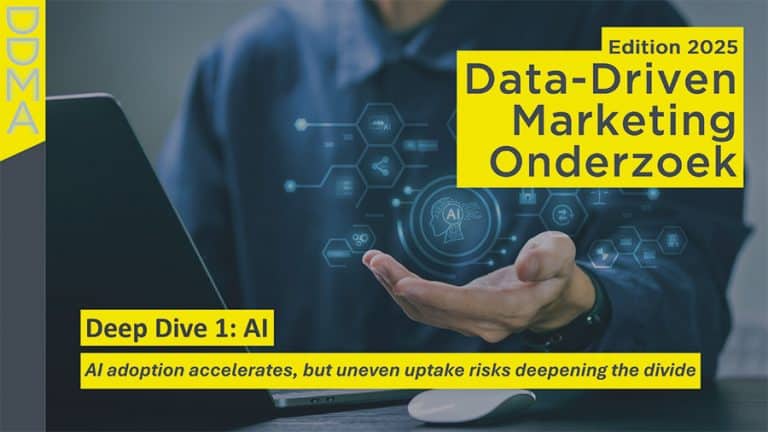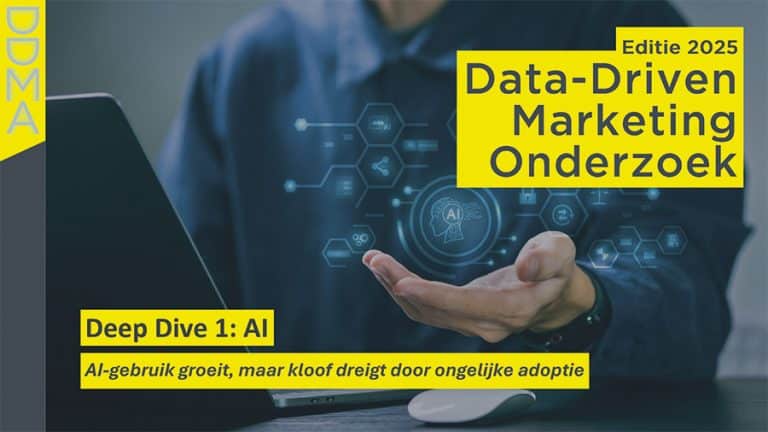Now that we have outlined the general impact and potential drawbacks, let’s dive deeper. We asked various DDMA experts from different corners of the marketing sector to explain the impact of Generative AI and LLMs within their own field of expertise.

Didric van den Borne (Merkle), DDMA Committee Creative
“LLMs are not yet a permanent part of our creative process, but I expect that to change very soon. Creatives love the application. We mainly use it now if it fits within the time, to play along in the ideation phase. It’s incredibly fun and addictive, but it does take time and expertise to get good results. This applies to LLMs but also to other generative AI, such as DALL-E. We sometimes use ChatGPT to quickly obtain a framework of a text and use it as a starting point. Or for ‘dumb’ SEO texts that nobody actually reads. I expect ChatGPT-4 to also play a role in prototyping because it can write code quite well.
Of course, there are also dangers. I see it as a tool that is constantly changing, but ultimately enables us to create what we envision. The dangers are misusing the tool or always using it and ignoring the rest of the toolbox. Another danger is that because LLMs play a greater role in the final product, the outcome becomes generic. Users can become lazy because the result is quickly sufficient and therefore not bother to create truly distinctive content. Another danger is that people take the outcome for granted and do not fact-check.
Of course, these new possibilities raise many (ethical) questions. AI learns from material. What is the quality of that material? Will it multiply incorrect content? Read Twitter for an evening, and you can already see the problem. Does the AI use personal data as input if it has accidentally been made public? And if the AI generates content so quickly, will content that has been worked hard on be overshadowed by AI-generated content without feeling? The future will tell.”

Martijn van Vreeden, DDMA Committee Digital Analytics
“LLM certainly has an impact on digital analytics, but perhaps (for now) in very different ways than in other marketing disciplines. Currently, you see that simple tasks can be taken over with ChatGPT, such as writing basic JavaScript functions. It is also used in some analyses, but this is only the case for very few organizations and has not yet had an impact on the masses.
You do see that the topic has an impact across the board within digital, but for now, I think we as the digital analytics committee will stay away from it.”

Jimmy de Vreede (Springbok Agency), DDMA Committee Data, Decisions & Engagement
LLMs are increasingly being used for marketing activities. Developers, data engineers and data scientists were the first and have been using AI assistants, for example GitHub Copilot, for about a year now. We also see that administrative and creative tasks are increasingly supported by LLM (e.g., writing commercial proposals or as input for a creative session, such as making a presentation, etc.). Adoption is currently depending on the person (the early adopter) but will broaden. In the longer term, I expect that more than 50% of marketing related tasks will be taken over by LLM.
For marketing operations, automated personalized content at scale will become easier – and achievable for any company. There are challenges to tackle. For example, what data to use, build your own or use a commercial model, how to consistently verify the output). I do not have any examples yet, but they will soon emerge. I am curious about how consumers will perceive this. What will be preferred; personalized content from LLM (possibly better) versus human-made content
Then there are also risks to take in consideration. Bias in the data, which will affect the output – a not easily solved problem. Additionally, there is fake news and the first examples of using LLMs in phishing are already here. Other challenges to consider are that LLMs will mainly be for the “happy few,” leaving other groups behind. The long-term risks, such as the replacement of humans by AI, might be true but do not really help discussions we need to have about the immediate challenges.

Kevin Duijndam (KLM), DDMA Committee AI
In the field of AI, the main influence is that there is more attention for what AI can do. The AI hype is back with a vengeance. At the same time, we must realize that the development of LLMs began much earlier. Especially the ‘foundation’ models, where you can fine-tune a very large model for a specific application, have caused a change in how you can develop AI for certain applications. At the same time, people are now mainly looking at ChatGPT to solve any problems, while for many applications, other models would be better suited.
Of course, there are also disadvantages. Firstly, a lot is still not clearly regulated for the use of Generative AI such as LLMs. Suppose you spend hours on the right prompts to get to a certain text. In that case, how is ownership divided between the owner of the LLM, the owners of input training data for the LLM, and your prompts to achieve the end result?
Additionally, LLMs are essentially text prediction algorithms. There is no notion of truth or substantive ’thinking power’ in them. This means that such a model generates total falsehoods very quickly and very ‘confidently’ (as far as a model can be confident). You have to be sharp to notice that.

Daan Aussems (SDIM), DDMA Committee Search
The influence of Large Language Models on search is enormous and now determines how search results are ranked. At Google, think of models such as BERT, MUM (LaMDA), and PaLM, which form search results and form the basis of new features in Search.
In 2019, BERT (Bidirectional Encoder Representations from Transformers) was implemented in Google Search. This masked language model is trained to understand the relationship of words in a sentence. Previously, the focus was always on the definition and order of words rather than context. The same words can have different meanings, and a preposition or adjective can be decisive for what one is looking for. Since the implementation of BERT, the search engine has understood the intention behind a search word (or complete sentences) much better. Google can, therefore, better dissect complex search queries and provide results that better match what one is looking for.
MUM (Multitask Unified Model) was introduced in 2021 and according to Google, it is 1000 times more powerful than BERT. MUM can make complex tasks simple and adjust the search results page accordingly. Based on your search query, the search engine displays information in the form of text, images, and videos that can help you. The groundbreaking feature of MUM is that it can understand information from many different languages and provide you with the correct information quickly. Visual content can be combined with textual content in any language.
In recent months, a completely new feature has been rolled out in Bing Search that has amazed almost every search marketer. By implementing ChatGPT in Bing, you can now (not yet accessible to everyone) chat in Bing Search. This allows you to engage in a real dialogue, and search results are displayed based on your interaction with the search engine.
Google responded not long after by announcing Bard. During the Google IO keynote, it was revealed that Google is bringing generative AI to Google Search, completely changing how search results are presented in the search engine. Based on generative AI, information from various sources is selected that best matches search queries, even for complex questions. This information is presented directly in the search engine, including the ability to further explore the topic and different perspectives. Information can be textual, but images and videos can also be used to provide answers. The search engine is becoming more and more like an answer machine where you can engage in dialogue directly in search.
Want to know more about automating SEO content? Watch the recording of our event on this topic here.

Andries Hiemstra ([ah]consulting), Expert Group Marketing Team of the future
LLMs have a reinforcing effect on the activities we have been doing up until now, whether or not we can do more. It offers opportunities to delve even deeper into the user’s content and context and can be an additional source of information and inspiration that marketers can consult and apply. However, it can only be used as an additional source of information and inspiration that marketers can consult and apply. The input of the marketer is crucial and will remain so. Therefore, it is important to consider how to blend AI and human intelligence optimally within the marketing team of the future.
This is a challenge that often arises with new technological developments. As a marketing team, it is important to think carefully about the risks and what you will use it for. Think of a clear usage vision, fear among employees, little knowledge of the tools, or uncertainty about ownership.
In conclusion
We can say that generative AI and LLMs are causing a lot of movement. However, the real widespread deployment of these technologies has yet to take place. The industry is very aware of the disadvantages of the technology and from various angles within the industry, people are still searching for its applications. There is a lot of experimentation going on and people recognise the sometimes astonishing results that generative AI and LLMs can produce and the endless possibilities it has. At the same time, it is collectively acknowledged, with the exception of Search, that the technology is not yet mature and that the road to full implementation within the industry is still some way off.
Want to learn more about Generative AI and Large Language Models? Then tune in to the first episode of the second season of the DDMA Podcast: Shaping The Future, where they delve into the positive and negative implications of this technology for the field of marketing.
Ook interessant

AI in marketing: van praten naar doen – hoe je écht aan de slag gaat

DDMO 2025: AI adoption accelerates, but uneven uptake risks deepening the divide





